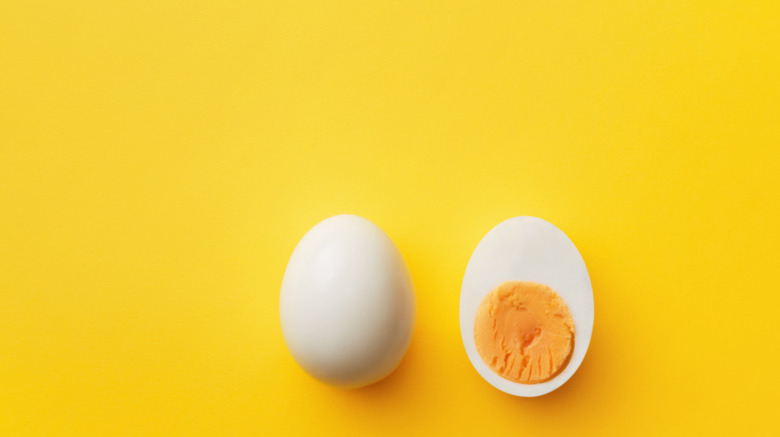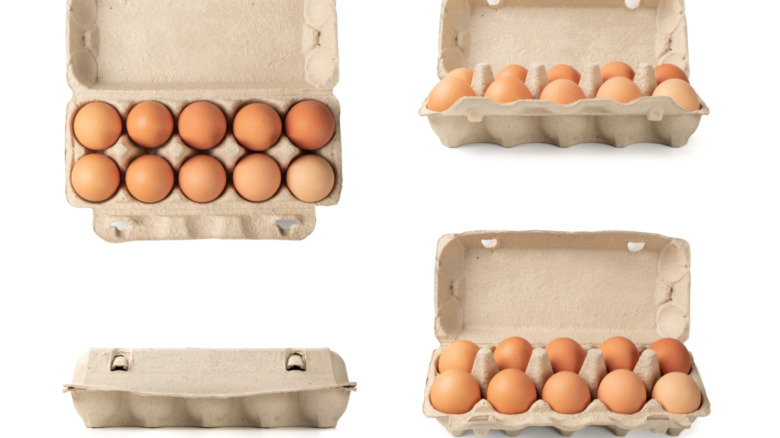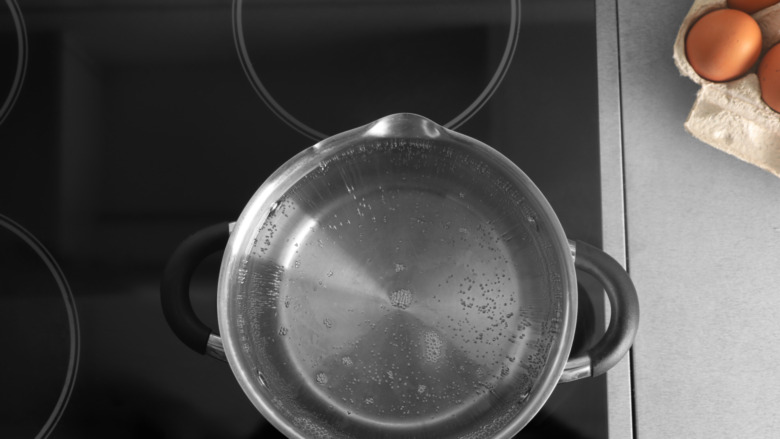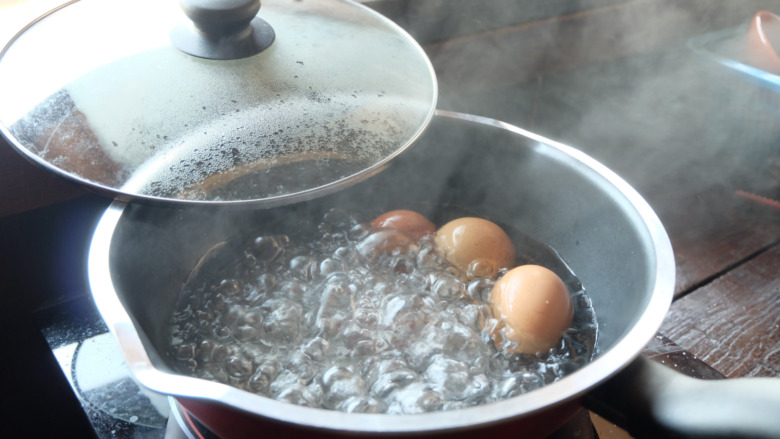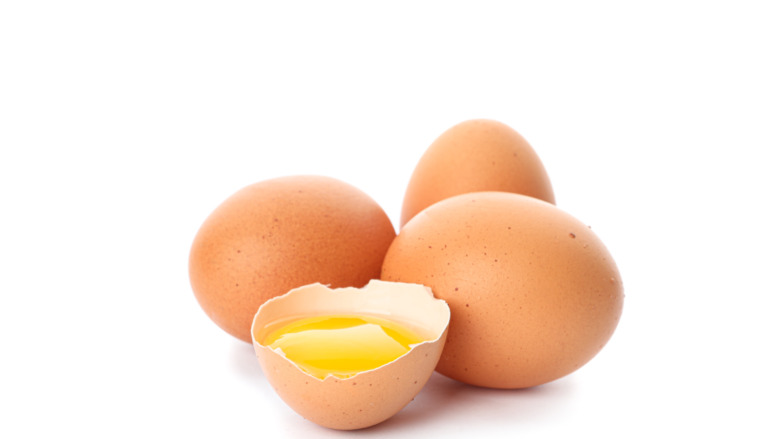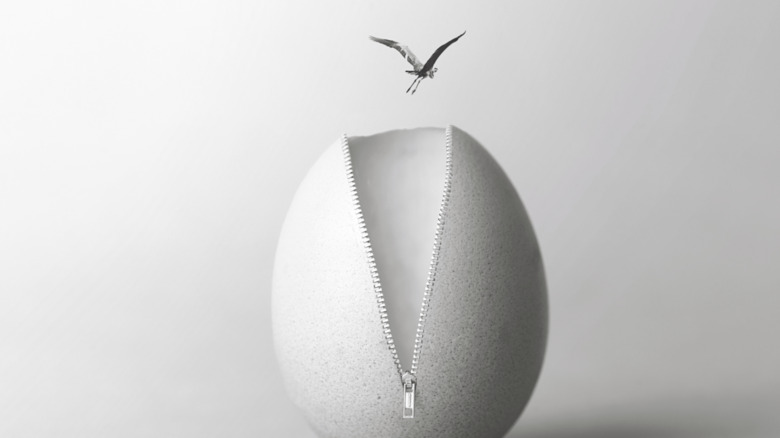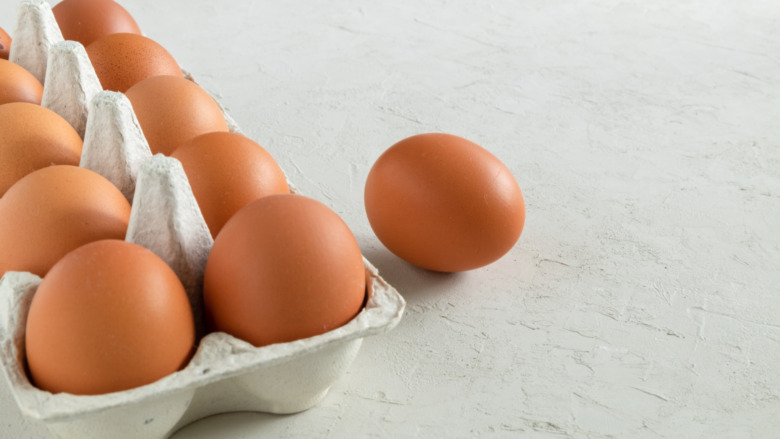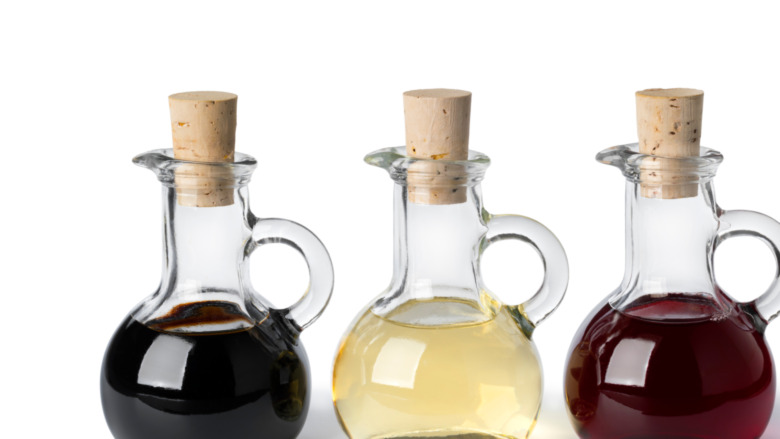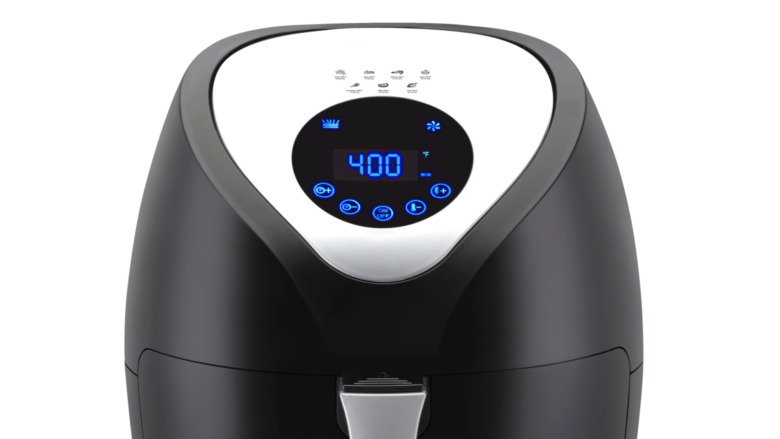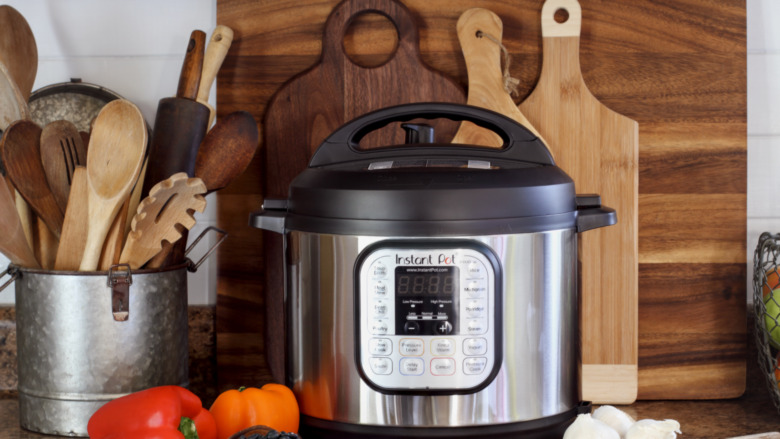Tips For Making The Perfect Hard-Boiled Egg
Hard-boiled eggs can be delicious and versatile. They are very budget-friendly and don't take long to make, and can be tossed in the fridge to be a quick snack at home or on the go.
One of the best things about these eggs is that there's so much we can do with them once they are prepared, from slicing them into a salad or sandwich or turning them into egg salad to making deviled eggs or eating them straight with some salt and pepper.
But hard-boiled eggs are not always so simple to make, and it's if they are overcooked, they become disappointing really fast. No one wants a greenish or gray egg, or one that is crumbling and hard or rubbery. But for perfect hard-boiled eggs, it's about technique — from how you store the eggs, to the kind of pot you use, to the temperature of the water and how long and where you cook it.
If you're frustrated with boiled eggs, just give it a little time. With these tips from the experts themselves, perfect hard-boiled eggs may just be a few easy steps away!
How egg storage can impact your boiled eggs
It may seem strange, but how your eggs are stored in the fridge after being purchased at the store can actually have an impact on how your hard-boiled eggs come out!
"Storing eggs upside down — in other words, that would be keeping the air pocket at the top versus the bottom — can help center the egg yolk. The air pocket gets bigger over time, and as a result, it pushes the yolk to the center for a prettier hard-boiled egg," Palak Patel, Chef at the Institute of Culinary Education, told Mashed.
After you make the hard-boiled eggs, storage is pretty simple. Allow them to cool and then put them in the fridge, and from that point onward, they should be good to eat for about a week (via PureWow).
So, while it may seem strange that you can impact an ingredient before even preparing or cooking it, when it comes to boiled eggs, it's very true. So keep this important first step and tip in mind if you plan on making hard-boiled eggs with your next batch of fresh eggs.
Use the right sized pot for making hard-boiled eggs
Eggs do need room to boil, and the size of pot you use is going to make a big difference in providing them enough space. Don't try to cram too many eggs in a pot that's two sizes too small, as this will cause several issues in how those eggs come out.
The issue is that if the pot is too crowded, that could make the eggs cook unevenly, and that means some parts of the eggs will cook faster than others (via The Kitchn). This is also the case if a pot is too small or if any bit of egg is sticking out of the water, as the egg above water just isn't going to cook at the same rate as the rest of the egg that's already submerged.
But there's more than even boiling to worry about: A more crowded pot also means there's a higher chance of the eggs cracking. And that's not only an issue for egg results and quality, but a cracked egg is bad for presentation and not something you'll want to serve your guests at brunch.
The correct time and temperature are necessary for perfectly boiled eggs
Making hard-boiled eggs is a science, in that the tiniest details do matter. But time and temperature are not a small matter — they will, in fact, make or break hard-boiled eggs.
"Large eggs need 12 minutes of cooking in boiling water if they're cold from the fridge, and 11 minutes if they're at room temperature. Small eggs will only need 10 minutes of boiling to be effectively hard-boiled," Devan Cameron, chef and owner of Braised & Deglazed, told Mashed.
It's important to note that these numbers are for after the water is already boiling. Some chefs advise bringing the water to a boil before adding the eggs for consistent results — but there are others with different advice, which we'll discuss below.
According to Cameron, boiling the water before putting eggs in is especially effective when you cook your eggs in bigger batches. "I once worked with a chef who put about 100 eggs in a very large pot of cold water, brought it to a boil and then set the timer for 12 minutes. This was a huge mistake because, by the time the water came up to a boil, the eggs were already overcooked," said Cameron.
The moral of the story is: Boil the water first (unless using the method below), then add your eggs, and only then set your timer. This will bring you consistently well-boiled eggs, according to some experts.
An alternative process for perfectly boiled eggs
If you don't want to wait for your water to boil before placing eggs in, you can also try an alternative process for perfectly boiled eggs.
First, you'll want to gently place the eggs into the pan, and then add cold water before bringing the pan to a boil. "Cold water is key to making sure the water comes to a boil [in] approximately 8 to 10 minutes, for cooking hard-boiled eggs consistently," Palak Patel, chef at the Institute of Culinary Education, told Mashed. This rule of thumb is for four cups of water.
And don't forget to be gentle: "You want a gentle boil, as a hard, rolling boil can crack the eggs before they are set," said Patel. Check eggs for small cracks that can expand in the water.
Once the water is boiling, remove the pot from the heat and cover it with a lid. You'll then set the timer for 10 minutes as soon as you see the water begin boiling. Then, says Patel, drain the water and roll the eggs in the pot gently to loosen the shells. Afterward, place eggs in a cold ice bath for 15 minutes. "Cooling down the eggs in an ice bath helps keep the yolk golden and makes peeling a lot easier," said Patel.
After the eggs are boiled, start peeling at the wide end of the egg near the air pocket and work up to remove the shell in large pieces, the chef advises.
Crack your hard-boiled eggshells after cooking
Making hard-boiled eggs is a work in progress for many of us, and if you've ever over-cooked eggs you'll perhaps notice they sometimes turn a weird shade of grey around the edges. Nobody wants that!
But why does that weird color reaction happen? "This is because of sulfur that gets trapped under the shell after cooking," Devan Cameron, chef and owner of Braised & Deglazed, told Mashed. But don't fret — sulfur is not toxic: Sulfur, according to WebMD, is a type of amino acid that has tons of purposes in nature, but is also found in protein — like egg whites — to help your body metabolize food. Basically, the iron in the egg yolk and the sulfur in the egg whites react when overcooked and make the ugly grey color, according to Jessica Gavin of Culinary Scientist.
However harmless sulfur may be, that doesn't mean you want to look at it. So, try not to overcook your eggs and avoid that unattractive problem! But, also, you'll eggs will just taste better if you don't overcook them, so that's all the incentive you need.
Use old eggs when hard boiling
It may seem counterintuitive — the best eggs would be fresh eggs, right? But actually not always, and the instance of hard-boiled eggs is one such example.
Old eggs work better for hard boiling because the pH level (AKA the level of acid), in the egg changes as it gets older, and that makes it a lot easier to peel (via Popsugar).
So the best thing you can do for that batch of eggs in the fridge? Let them sit there for a bit before using them: "Age your eggs for about one week, as long as it's not past the expiration date, and this will make them much easier to peel," Devan Cameron, chef and owner of home cooking website Braised & Deglazed, told Mashed.
Of course, you don't want your eggs to age so long that they pass that expiration date, so always pay attention to labels!
Add vinegar to boiled eggs for easy peeling
PH, a chemistry term that refers to the acidity of an object or ingredient, comes up again in the hard-boiled egg process, and this time it's because we're talking about adding a common pantry ingredient to change the pH of your boiled eggs.
Just like how the pH level changes with older eggs, adding vinegar to your cooked eggs will also change their pH level and make the eggs easier to peel — and that's always welcome. It's very simple to do, too.
"Add a good splash of white vinegar to the water the eggs are cooling in and let soak for 5 to 10 minutes," Devan Cameron, chef and owner of Braised & Deglazed, a culinary tips website, told Mashed.
With some vinegar handy, your eggs will be magically easier to peel, and you won't even have to let them sit in the fridge for an extra week!
Try hard boiling eggs in the air fryer
While the obvious way to cook a batch of hard-boiled eggs would be in a pot with water that is boiling (hence the term hard-boiled), recently, a trend emerged that involved cooking eggs in an air fryer — with no water at all!.
The air fryer is an appliance that sits on the counter-top and works much like a convection oven, no stove required. It's used for everything from wings to fries, but according to AllRecipes, it can also be used to make hard-boiled eggs.
This hack, born on TikTok, is as simple as placing the eggs in the air fryer and then setting the appliance to 250 degrees Fahrenheit for about 15 minutes. After that, the eggs just go in an ice water bath to stop the cooking process and make peeling easier, and you're done, with perfectly cooked hard-boiled eggs that are not dry or overcooked or rubbery. Seems too good to be true, but it's not. Hard-boiled eggs without boiling? Technology is amazing!
Or make your boiled eggs in the Instant Pot
Much like the story with the air fryer, another unexpected place to make a batch of hard-boiled eggs is in the trendy Instant Pot.
"If I had to pick one way to cook boiled eggs for the rest of my life, Instant Pot hard-boiled eggs would be it," Jessica Randhawa, head chef and creator behind The Forked Spoon, told Mashed.
Why does Randhawa like this method so much? Well, presentation is a big part of it — the eggshells do not stick. Never, not once. "With a silicon instant pot stackable egg rack, you can make perfect hard-boiled eggs in bulk, perfect for deviled egg appetizers," said Randhawa.
All you need to do, says Randhawa, is add one cup of water to the inner pot of your Instant Pot, put in the egg or steamer basket, set to manual mode with high pressure for 5 minutes, and then let the pressure to release naturally for 5 minutes, followed by a quick release and then an ice bath.
Try this viral hack for peeling hard-boiled eggs
If the vinegar trick doesn't work for you, fear not: There are plenty of other hacks for peeling hard-boiled eggs, including one that went viral earlier this year.
In March, TikTok user @aymlessleigh84 posted a video showcasing the simple step she takes to make peeling a hard-boiled egg a walk in the park. According to her, all you need to do is gently tap the bottom of the egg a few times with the back of a spoon prior to putting it in the boiling water. Keep tapping until you hear a different sound (what she describes as a "ping"). This step helps separate the egg's membrane from the shell. When the egg is cooked and ready to be peeled, the shell should be easily removable as it is no longer attached to the egg itself.
The video quickly went viral, collecting nearly 7 million views in less than two months. Even better –- many of the post's 10,000-plus comments confirm that the trick works. "It does work! Been doing this for a while and it is a must!!!," one commenter wrote. "Thank you so much for this information," another added. "I have chickens and trying to peel fresh eggs is such a nightmare. Just tried it and works perfectly."
